11 reasons chickens sleep in nest boxes and how to stop it.

Some keepers think there is really nothing wrong with chickens sleeping in their nest box unless you have a specific reason for not wanting this or that its also fine if they pile in on top of each other.
I would say that chickens can and do smother each other piled into boxes and that chickens sleeping on the ground or in nest boxes brings a whole host of other problems.
Below: Hens sleeping in a nest box.
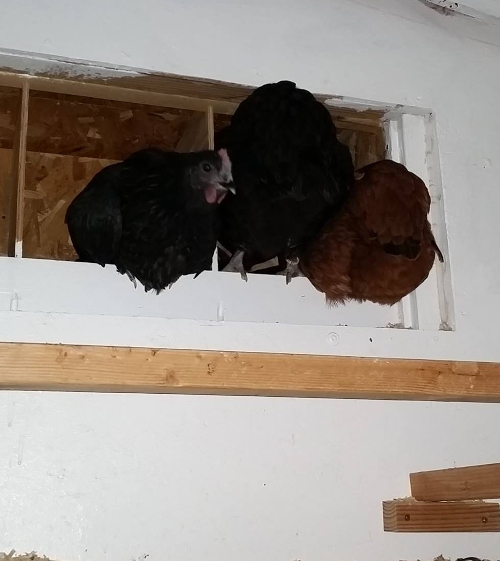
It looks harmless enough but can bring many problems.
Is it OK for chickens to sleep in nest box?
No, not really. Chickens should roost to sleep. It is good for their well-being and makes them feel safer to roost on a high perch. Also a chickens digestive system works all the time and they poop while they sleep.
Below: Chickens poop all night and will soil nesting boxes.
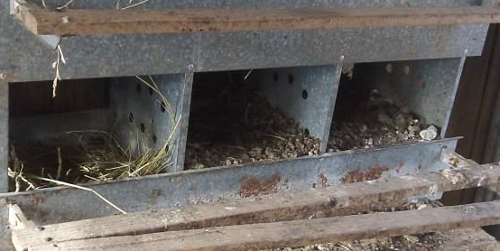
Chickens sleeping in nesting boxes run the risk of breaking and eating their own eggs which is a bad habit to get into and is best avoided.
If they are in a nesting box they get dirty vents and feathers, not to mention the mess it makes of the nesting material in the box. It will cost you more money in nesting material and more time in cleaning and you will get dirty part incubated eggs. Trust me when I say it is a real pain in the backside to clean every day.
Also chickens can overheat and smother piled in nest boxes.
Below: Chickens can overheat or be smothered in nest boxes.
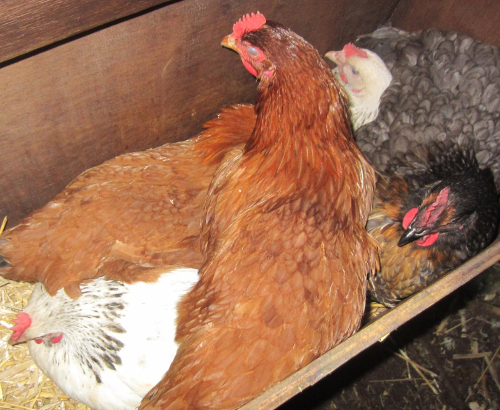
It's a really easy problem to solve.
Why do chickens sleep in the nest box?
Chickens sleep in the nest boxes for many reasons, pretty much all of them are easy to deal with and can be fixed with some small alterations.
- Poor chicken coop design. Birds need space to get down of perches.
- Perches are poorly made or have sharp edges.
- The nest boxes are too high.
- The perches are too low.
- Maybe they don't know how to roost. Artificially raised chicks sometimes do not learn to perch as they don't have a mother hen to teach them.
- They are Silkies which can not fly.
- Maybe they are being picked on by others or have an injury that prevents them from getting to the perches.
- There are mites in the coop.
- Design of or nest box fillings.
- Keeping your chickens in the coop all day.
- Age. Very young or old birds will struggle to get to perches.
So were not talking about broody hens, If you need to deal with broody hens then take a look at these two articles - 7 ways to break broody hens and - looking after broody hens and her chicks.
Below: It's a bit of an untruth that Silkies can't roost. They can get up high but need a little help. This one is on the top of a fence post.

But that would cover day and night, except for a couple of times per day when they hopefully jump down to eat and drink. If that is the case then the question would be how to break a broody hen. link and link to broody articles
How do I stop my chickens from sleeping in their nesting box?
You should consider getting this done as soon as possible because they will end up breaking an egg or two by sleeping in there and they'll eat it. Once a chicken tastes the delightful flavour of a farm fresh egg and crispy shell it's hard to get them to stop.
This problem often starts with the keeper adding young birds straight into the coop. They head straight for the nesting boxes as they are enclosed and a little dark and the birds feel safe.
If you are raising young birds that gave not yet started to lay then cover the nest boxes for a few weeks until things settle down. You only need a sheet of cardboard cut to size.
Below: Young birds are most at risk.
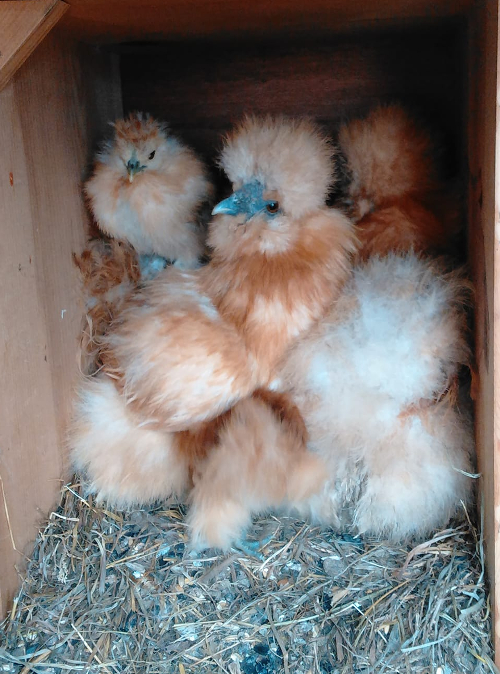
If you really don't want them to go into their nest boxes at night, you can block them with pieces of wood or cardboard, cut to size.
There are also some pre-made boxes that have a perch outside that you can fold up and it blocks the box opening halfway up. This won't work 100% if a hen is really determined, but it is discouraging to them.
If you block the boxes remember to unblock them first thing in the morning as if you have laying hens. If you block the boxes all the time they might get confused about where to lay or they may hide their eggs outside.
Getting your hens to stop sleeping in the nest boxes will save you extra costs, cleaning time as well as broken, dirty and part incubated eggs.
Ways to get chickens to stop sleeping in the nest box:
- Use an older hen that knows the ropes and perches to show them how its done.
- Make the perches higher than the nests. If you give them a better place to roost at night that is even higher then they will adjust, even if it takes a few weeks. Chickens prefer to roost on the highest point they can. I recommend taking a branch and securing it in your coop at least two feet above the top of the nest boxes, my chickens love the natural feel of a real branch.
- Cover the nest boxes at night.
- Actively place the birds on the roosts, they will soon get the hang of it.
- Give the a choice of perches and heights.
- Make sure that there is no bullying or pecking going on. You could have the perfect amount of space and selection of perches, but some birds may be bullying others (and some breeds are more prone to this) so it could be that the ones in the nest boxes are trying not to get pecked.
- Treat for lice and mites. Being bitten at night may keep the birds off their perches.
You will quickly see that the area under the roost collects a lot more poop than any other area. Chickens poop during the night so it accumulates. Depending on what the floor of your coop is made of, you can manage the mess in several different ways.
Below: Cheap pre-fabricated or self assembly chicken coops often have the perches and the nesting boxes at the same height.
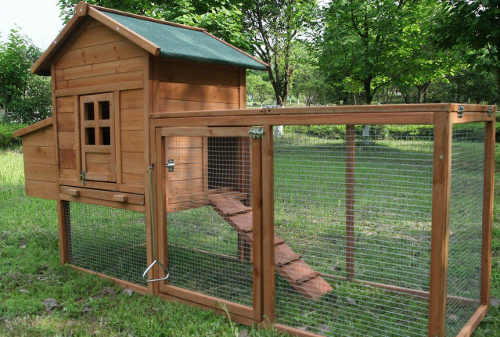
I give my chickens many different choices, each bird is individual and they tend to go to their usual spot. If you are sure that they have proper coop space, (24 sq ft per bird, the more the better,) and a variety of perches available, then you are be dealing with certain birds preferences.
Below: Rescue or ex battery chickens chickens never learned to roost and need to be taught.
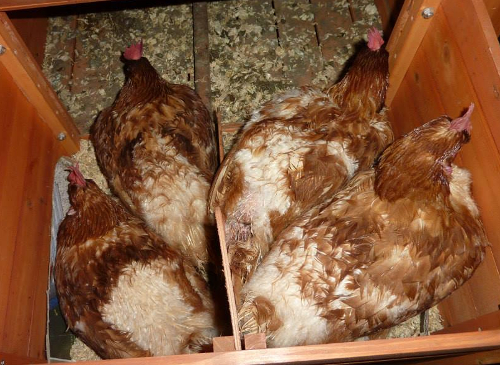
The perches can be flat or round and at least 2" wide.
Round perches are really good for chickens as they evolved to perch on branches in trees.
Flat perches must have rounded edges to prevent bumble-foot and injuries.
Move them to the roosting bars while they get ready for sleep a few times in a row and they'll get it.
What if your rooster is sleeping in the nest box:
Cockerels and roosters sleeping in the nest boxes or on the ground is normally because they are being bullied or injured.
In my experience males are better at roosting than hens, mostly because they never have any real reason to spend time in a nest box. Also check for mites or lice as this is another common reason the males are in the nest boxes.
Conclusion:
Next, make sure that the perches are higher than the nest boxes. Chickens like to perch in the highest place that they can.
Now, I'm not promising that these will work with all hens, but it will definitely help. Anything to keep all that poo out of the nest boxes.
Lock the boxes off at night and put them on the roost. The rule of thumb is to have 12 inches of perch per bird or more. I have a whole extra perch for all the flapping that happens as the hens settle down for the night.
You don't want them having to jostle and fight to get a space. Make sure you have perches at a couple of different heights and also diameters, or use a thin shelf or 2x4.
Keeping chickens from sleeping and pooping in nesting boxes will save you time and money and make your birds happier.
